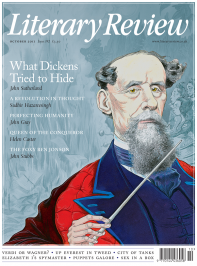Clare Clark
Slaves to Fortune
The Quality of Mercy
By Barry Unsworth
Hutchinson 294pp £18.99
On a cold night in 1767, thanks to an uncommon piece of luck, a convict destined for the gallows walks free from Newgate Prison. Almost immediately, in a second stroke of good fortune, he finds a drunken man, prostrate on the road, his purse heavy with coins. The scene that follows, as the convict takes first half and then almost all of the man’s money, and then returns a third time to relieve him of his coat and boots, all the while intent upon justifying his actions as only fair and reasonable, is a masterful piece of writing. Comic, touching and profound, it hurls the reader head first into the earthy, opportunistic eighteenth-century world of Tristram Shandy and Moll Flanders. It is also a pitch-perfect evocation of the moral flexibility of those set on financial gain.
Almost two decades after his novel Sacred Hunger famously shared the 1992 Booker Prize with Michael Ondaatje’s The English Patient, Barry Unsworth has published its sequel. Set on board an eighteenth-century slave ship, Sacred Hunger was an impassioned epic about the corrupting power of greed and the striving for profit ‘which justifies everything, sanctifies all purposes’. The book was a response to the unbridled materialism of Thatcherite Britain and the deification of wealth that has continued in the intervening years, through boom and bust, to define Western society. Little wonder, then, that The Quality of Mercy, which takes up the story of the mutinous crew two years later, marks a return not only to a number of the characters first encountered in Sacred Hunger but to its central themes.
Sullivan, the escaped convict of the opening chapter, is one of the sailors dragged back to England by Erasmus Kemp, the son of a bankrupted slave-ship owner, to face trial for piracy and murder. At the same time, in the civil courts, Kemp is endeavouring to extract compensation from his

Sign Up to our newsletter
Receive free articles, highlights from the archive, news, details of prizes, and much more.@Lit_Review
Follow Literary Review on Twitter
Twitter Feed
Under its longest-serving editor, Graydon Carter, Vanity Fair was that rare thing – a New York society magazine that published serious journalism.
@PeterPeteryork looks at what Carter got right.
Peter York - Deluxe Editions
Peter York: Deluxe Editions - When the Going Was Good: An Editor’s Adventures During the Last Golden Age of Magazines by Graydon Carter
literaryreview.co.uk
Henry James returned to America in 1904 with three objectives: to see his brother William, to deliver a series of lectures on Balzac, and to gather material for a pair of books about modern America.
Peter Rose follows James out west.
Peter Rose - The Restless Analyst
Peter Rose: The Restless Analyst - Henry James Comes Home: Rediscovering America in the Gilded Age by Peter Brooks...
literaryreview.co.uk
Vladimir Putin served his apprenticeship in the KGB toward the end of the Cold War, a period during which Western societies were infiltrated by so-called 'illegals'.
Piers Brendon examines how the culture of Soviet spycraft shaped his thinking.
Piers Brendon - Tinker, Tailor, Sleeper, Troll
Piers Brendon: Tinker, Tailor, Sleeper, Troll - The Illegals: Russia’s Most Audacious Spies and the Plot to Infiltrate the West by Shaun Walker
literaryreview.co.uk